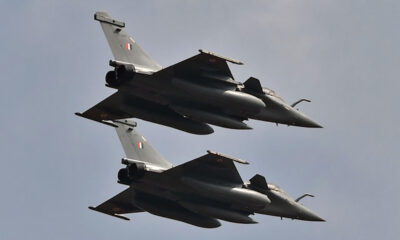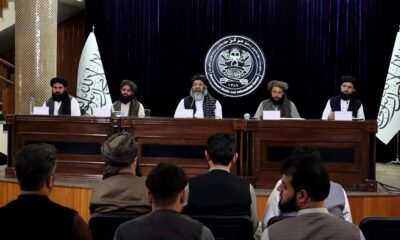Latest News
SIGAR paints bleak picture on immediate future

The Special Inspector General for Afghanistan Reconstruction (SIGAR) John Sopko on Wednesday painted a bleak picture of what lies ahead for Afghanistan in the event of US troops withdrawal by May 1 and the possible withdrawal of funding which props up the Kabul government.
Addressing the US Congress’ Subcommittee on National Security, Sokpo stated that future funding for Afghanistan faces two principal risks: “whether expanding the conditions donors set for funding will be sufficient incentive to facilitate and maintain an acceptable peace agreement, and whether the level of foreign assistance during this uncertain period is sufficient to prevent state collapse”.
Sopko said Afghanistan remains exceptionally reliant upon foreign assistance, creating both an opportunity for donors to influence events in the country as foreign troops depart, and risks to a potential peace if the US reduces assistance too much, too fast, or insist on conditions that cannot be achieved by the parties to the conflict
According to Sopko, part of the US-Taliban deal stipulates that not only must all foreign troops be withdrawn by May 1, but the 18,000 odd foreign contractors currently in Afghanistan, who mainly assist with training and advising, would also have to leave.
He said about 7,000 of those are US citizens and the remaining 6,000 are non-Afghans who are third party nationals (from other countries).
Sopko told the House Committee that in the event of troops being withdrawn “it would hurt the Afghan government” but if all contractors were to leave the Afghan air force “would probably lose its capability of flying any of its aircraft within months”.
He also hinted that a sudden withdrawal could lead to a total collapse of state, “especially if we withdraw funding”.
Asked whether the Taliban was a single entity or a fractured body, Sopko said there were some indications during the early part of negotiations with the US last year that there was some unity within the group but he said since then “you’ve got individual groups that will go off on a frolic and a detour at will.”
Sopko said that while an audit into this has not been done, he felt the Taliban was not able to control all its groups.
On the possible influence in Afghanistan post-peace by China, Russia, Pakistan and Iran, Sopko said all four countries have historically played a role in funding insurgents or funding warlords or “corrupting officials in Afghanistan”.
He said going forward, these four countries “would all play a role in a post-peace government” but what that role would be, he said he did not know.
“They all have an interest in Afghanistan,” he said, adding especially Pakistan and Iran.
Ghost soldiers still and issue
On the issue of ghost soldiers Sopko said this was still a major problem but that SIGAR has not been able to get to document the problem.
He also said officials steal the salaries of soldiers and even their food.
He noted that such actions lead to soldiers losing morale despite the fact that “there is a will to fight” for their country, he said.
He also said SIGAR does not have the capacity to collect data from regions in order to audit something like this.
Corruption a matter of serious concern
Sopko stated that investigations have identified corruption at virtually every level of the Afghan state – from salaries paid by international donors for Afghan soldiers and police who do not exist – to theft of US-military-provided fuel on a massive scale
Sopko said corruption “is also fueling the insurgency to some extent” as the Taliban then “point towards” corrupt officials, corrupt warlords and point to the fact that there is immunity – for top officials in the country – who never get sent to prison.
In his opinion, ther are diplomatic reasons for staying in Afghanistan.
One is that having boots on the ground is helpful in terms of counter terrorism efforts and also that if the US pulls out it will lose everything that it has invested over the past 20 years.
A further destabilized Afghanistan could also be a big problem for the US in future, he said.
But he noted that “everyone in Afghanistan realises they need foreign assistance”.
“We know the Taliban want foreign assistance”, including the removal of the name’s from the blacklist.
Imposing conditions around funding the government was something that needs to be focused on, Sopko said, having said earlier that not enough conditions have been put in place by the US in terms of ensuring funding did not go to waste..
Asked if Afghanistan still has serious issues with corruption, Sopko said bluntly “Yes!”
He also agreed that corruption was having a serious impact on reconstruction efforts in the country and that some of the money given to the Afghan government for reconstruction efforts could have found its way into the pockets of insurgent groups.
Asked if it was possible that some of the $148 billion spent by US in Afghanistan in the past 20 years had been used by “terror groups”, Sopko said: “Of course; Yes; Of course.”
While the Afghan govt has repeatedly assured the international community that it has the political will to combat corruption & make needed institutional reforms, it has a mixed record of completing them
He said: “Corruption and narcotics is the oxygen that keeps the terrorist groups alive in Afghanistan.”
Asked if he shares Congress members’ concerns that US tax payers dollars are fronting billions of dollars to a corrupt country with no truly effective means of tracking it, Sopko said: “Yes we are very concerned about that. That’s why we say one of the risks is oversight. You have got to have some oversight. Otherwise you may as well just burn the money in Massoud Circle.”
One Congressman James Comer pointed out that the oversight committee needs to know where the money is going but said in his opinion he does not “see a viable long term strategy for the United States in Afghanistan,” and that he “strongly supports withdrawing troops.”
He said he understands the problems that Afghanistan is going to have when troops are gone “but the American taxpayers don’t want to spend anymore money in Afghanistan.”
“This has been the sentiment from the majority of my constituents and I think the majority of Americans for many many years now.”
Despite major achievements having been made regarding women’s rights in the country, Sopko said Afghanistan is still one of the worst countries to be a woman particularly for those living in a rural environment.
“It’s only in the cities where we have seen some real good improvement”. He also said the Taliban has not indicated much in the way of them being prepared to support women and girls in a future Afghanistan.
But one thing to keep in mind is that even the Afghan government hasn’t done enough for women, he told the committee.
Referring to a recent ban – that was subsequently overturned – on girls over 12 being able to sing the national anthem in a mixed environment, he said: “That sort of tells you about a cultural divide among Afghans even Afghans in government.”
If there are no “boots on the ground”, the US will lose a lot of leverage and if “there is no oversight, you can just forget about any of that money that we appropriate for helping women and girls from ending up helping” them, he said.
Training and supporting the Afghan military and police is also part of the term “development” in terms of US funding, said Sopko adding that COVID-19 has limited the US troops in Afghanistan from fully assisting the Afghan military.
Sopko said it would be very difficult to carry on conducting oversight if all troops are withdrawn and said none of the regional roleplayers could help with oversight if the US withdraws. He specifically said that no one would be comfortable handing over this sector to Iran, Russia or Pakistan.
Latest News
IEA to establish ministry for usurped land reclamation
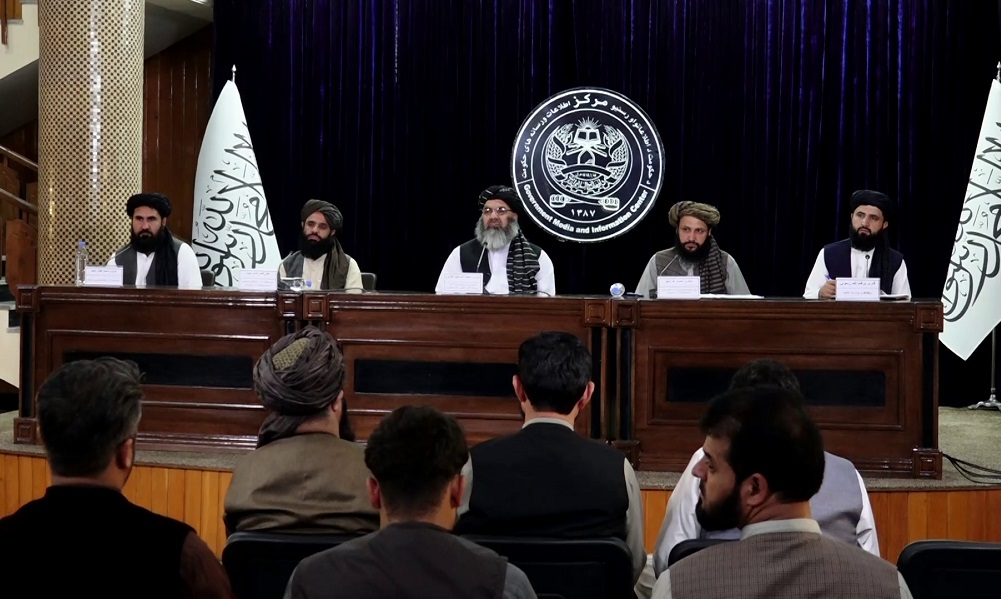
The Ministry of Justice said on Sunday that the Supreme Leader of the Islamic Emirate has issued a decree to establish a new ministry under the name of usurped land reclamation.
Currently, the work of reclamation of usurped land is being carried out by a commission.
The commission said in a press conference that 49.7 million acres of usurped land have been identified across the country, of which 3.9 million acres have been reclaimed.
Officials of the commission stated that 36 residential townships in Kabul have been assessed and decisions have been issued on 13 of them.
According to officials, people who have purchased land in illegal townships have all their rights reserved with the commission and only township owners are considered as usurpers.
They also stated that 370,000 acres of land have been allocated for the Kabul New City project and that currently, four companies are involved in this project.
Latest News
Sirajuddin Haqqani meets with special envoys of China and Pakistan in Kabul
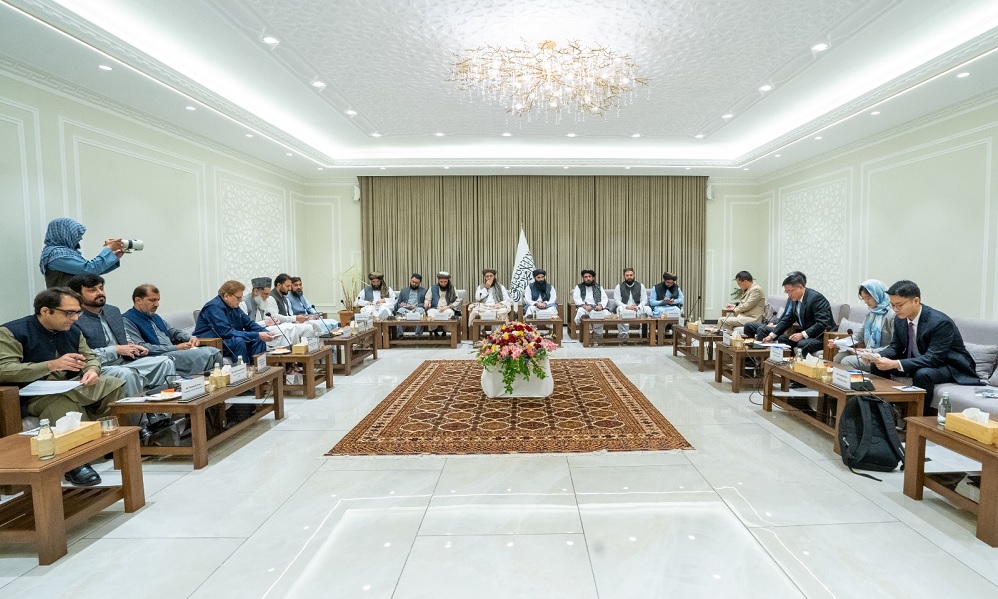
Acting Minister of Interior Sirajuddin Haqqani met with China’s special envoy for Afghanistan, Yue Xiaoyong, and Mohammad Sadiq, Pakistan’s special envoy, to discuss regional cooperation and diplomatic engagement.
According to a statement released by the Ministry of Interior on Sunday, the meeting aimed to follow up on the outcomes of the fifth trilateral meeting of the foreign ministers of Afghanistan, China, and Pakistan. The discussions also focused on preparations for the upcoming sixth round of talks and on deepening political and economic cooperation among the three nations.
During the meeting, Haqqani emphasized the Islamic Emirate’s commitment to fostering strong regional ties. He called for regional understanding and cooperation, especially in political and economic fields, based on mutual respect.
The Chinese and Pakistani diplomats reaffirmed their countries’ commitment to strengthening relations with Afghanistan. They also agreed that the sixth meeting of foreign ministers from the three nations will be held in Kabul.
Latest News
Afghan government employees urged to apply diplomacy when commenting about another country
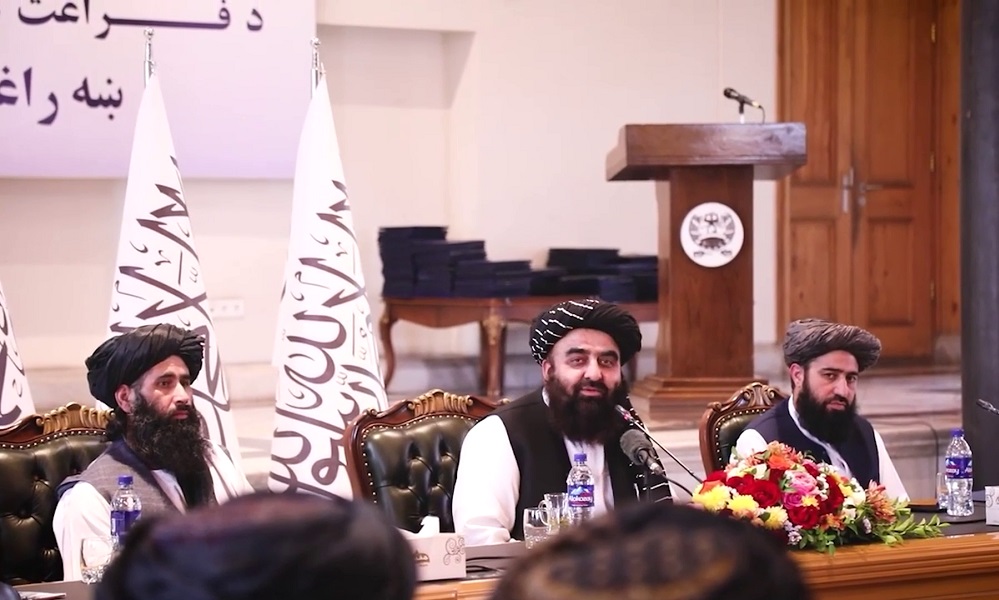
Acting Foreign Minister Amir Khan Muttaqi on Sunday instructed government employees to refrain from making comments or statements that could hurt a country.
Addressing a graduation ceremony of government employees who passed a specialized diplomacy training course, Muttaqi warned that such negative comments would also harm the Islamic Emirate.
“Try to be careful with your pen. Be careful with your tongue so that no Muslim, no neighbor, no country is hurt. Avoid harming the system and yourself. Sometimes, there are shots that then come back to the hitter. You have to be very careful in this matter. Whatever you say, you have to think about whether it is permissible in Islam? Will it not end up harming another Muslim?”
Muttaqi also emphasized that Afghanistan will not progress if fundamental steps are not taken in the academic field.
“If we do not take steps in the academic field, do not educate ourselves, do not work hard, do not know about the world conditions, do not know about the customs of the homeland, do not know about our past history, we cannot build our future. We need a lot of work in our home and each department needs a professional. If you gather all the members of your family, you cannot treat a child with fever until you see a doctor. You cannot build a bulb. You cannot make clothes. Therefore, every field has its own professional and this society needs them,” he said.
Muttaqi also called on the graduates to strive to enhance their knowledge and to guide the future path of Afghanistan towards development.
-

 Regional5 days ago
Regional5 days agoAt least 26 civilians killed in Indian strikes on Pakistan: Islamabad
-

 Science & Technology5 days ago
Science & Technology5 days agoSkype ends operations after 22 years of service
-

 Latest News5 days ago
Latest News5 days agoIslamic Emirate of Afghanistan ‘concerned’ over rising tensions between Pakistan and India
-
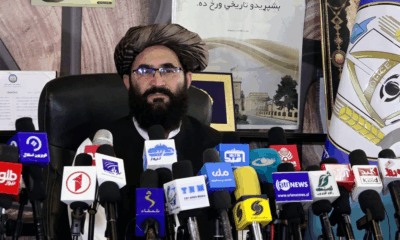
 Latest News5 days ago
Latest News5 days agoPassport Directorate earns nearly 13 billion AFN in one year
-

 World5 days ago
World5 days agoMacron to meet Syrian president on Wednesday, expected to discuss security
-

 Health5 days ago
Health5 days agoWHO confirms second Polio case in Afghanistan
-

 Regional4 days ago
Regional4 days agoIndia dismisses report of Pakistan downing jets as “disinformation”
-

 Latest News5 days ago
Latest News5 days agoUNAMA seeks over $400 million to support returnees to Afghanistan in 2025




